Redditor Gets Rid Of Partner's Dog Because It Tore Their Precious Stuffed Care Bear Toys To Shreds
You know how affectionate dogs can be if you own one. We laugh out loud and feel happy when we are with our dogs.
They never fail to make us grin from ear to ear, whether it's the dog in our own backyard, a funny picture we see on social media, or a humorous video. In fact, canines all have a sense of humor.
Your dog will listen if you tell them about a horrible date or a difficult workday. We are certain that whatever we tell our dogs will always remain a secret.
If you observe your dog throughout the day, you'll realize they are better companions than most people. And we see such a scenario in today's story, where the OP is someone who has never liked dogs.
In fact, the OP thinks dogs are loud and annoying but chose to put all those feelings aside after discovering that their partner had a senior dog. The OP has a cat, and they both agreed that they wouldn't get any pets after their animals passed away.
The elderly dog dies, and the partner decides to get a new puppy without informing the OP. Fast forward to the dog ripping the stuffed Care Bear to shreds; the OP quickly got rid of it, and the partner likely didn't take it seriously.
Read the entire story below.
The Title

We had both agreed that we wouldn't get any pets after our animals passed
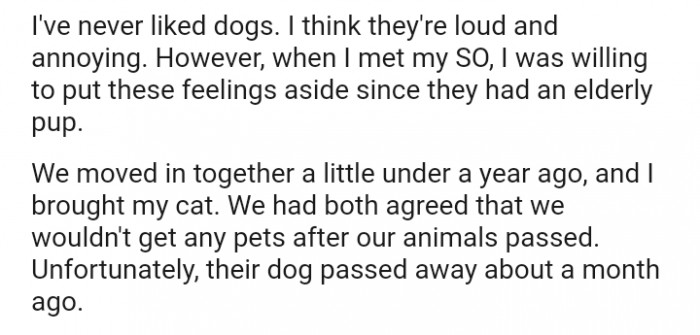
My partner did try their best to train it
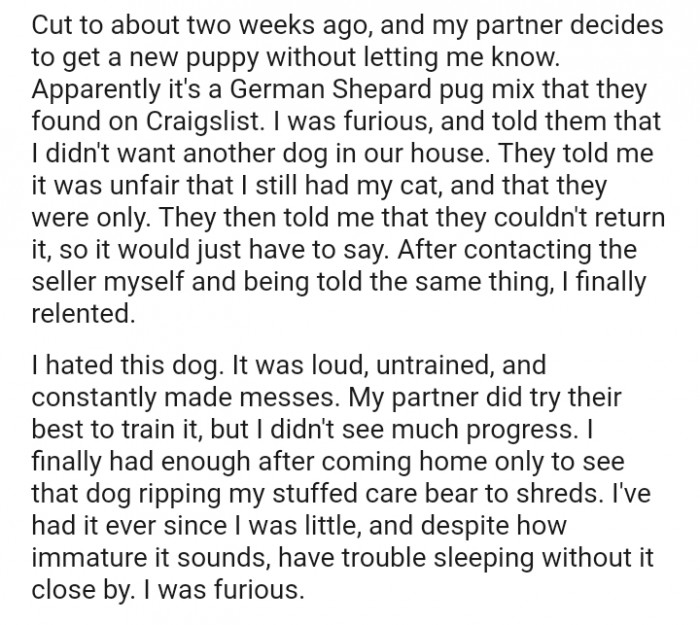
Understanding Attachment Styles in Relationships
Dr. Lisa Green, a clinical psychologist, explains that attachment styles developed in childhood can profoundly influence adult relationships. In this scenario, the act of getting rid of a partner's dog may reflect underlying insecurities or fears of abandonment.
Research published in the Journal of Personality and Social Psychology indicates that individuals with anxious attachment styles often feel overwhelmed in relationships, leading to impulsive decisions driven by emotional distress.
Understanding Relationship Dynamics
Dr. Fiona Lee, a relationship psychologist, explains that conflicts over pets often reveal deeper relational issues.
Her research shows that disagreements about pets can symbolize larger struggles around boundaries and respect within relationships.
Recognizing these dynamics can help partners better navigate their conflicts.
The OP thinks what they did was justified since they never had a choice in the matter
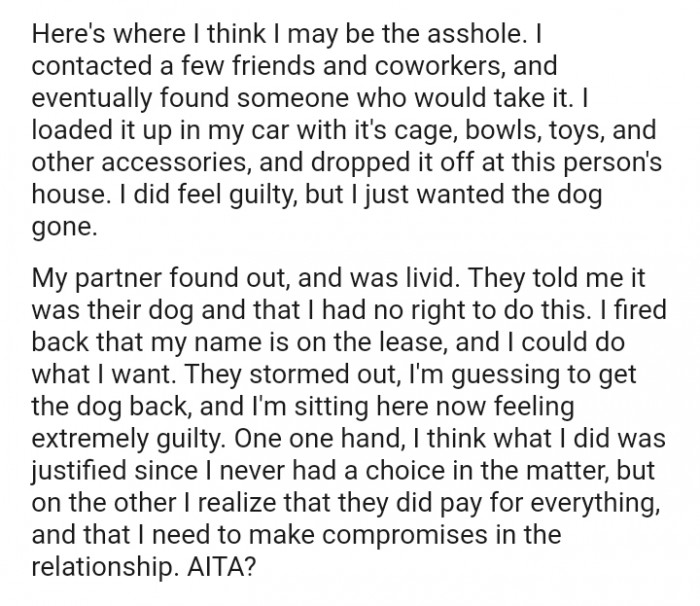
The Reddit thread received more than a thousand comments, and we've gathered some of the most upvoted replies for you to read through below.
You should have ended the relationship

You are both selfish and immature
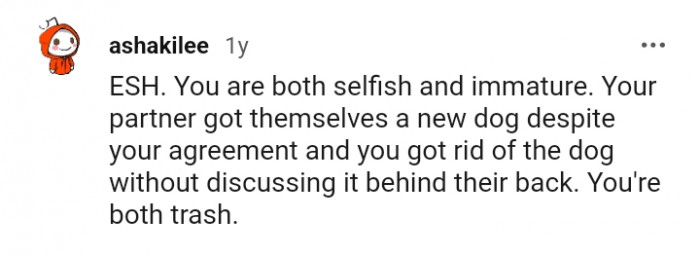
The decision to remove the partner's dog can also illustrate a lack of empathy or understanding towards shared emotional investments. A study from the University of Virginia highlights that when partners fail to recognize each other's emotional attachments, it can lead to significant relational discord.
Understanding these dynamics is key to fostering healthier relationships.
Studies indicate that how partners handle conflict can significantly influence the overall health of their relationship.
When one partner feels their belongings are threatened, it can lead to feelings of invalidation and resentment.
This highlights the importance of discussing boundaries and mutual respect in relationships.
Break up and live a happy dog-free life
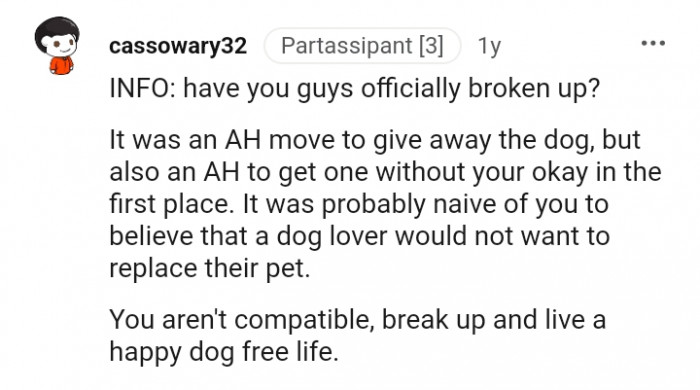
Dating dog owners is not a good idea

This Redditor hopes the OP can fix this
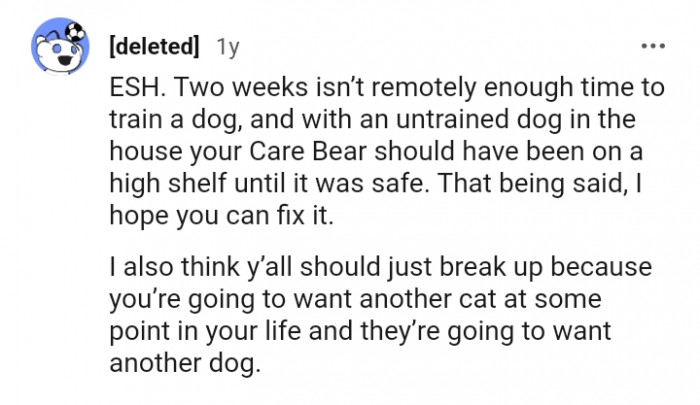
The Role of Communication in Relationships
This situation underscores the importance of open communication in relationships. When one partner feels their emotional needs are not being met, it can lead to drastic actions that may not reflect their true feelings.
According to research in the Journal of Social and Personal Relationships, effective communication strategies can significantly improve relationship satisfaction and reduce impulsive behavior during conflicts.
The Role of Communication in Conflict Resolution
Effective communication is a critical component of conflict resolution in relationships.
Research published in the Journal of Social and Personal Relationships highlights that couples who communicate openly are better equipped to manage disagreements.
By fostering an environment of respect and understanding, couples can create healthier discussions around conflicts.
They should not have gotten the dog
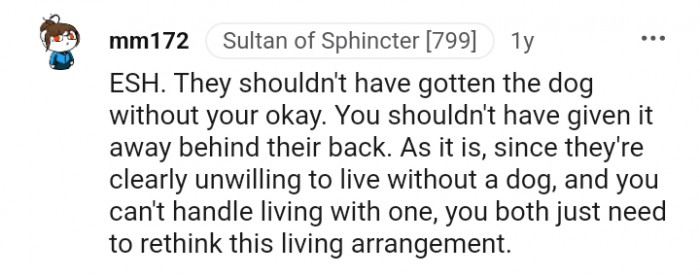
Your partner broke an agreement you both had
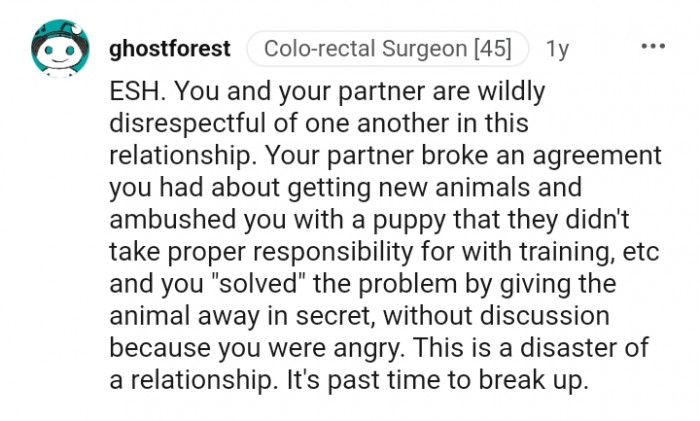
Your whole relationship needs more communication
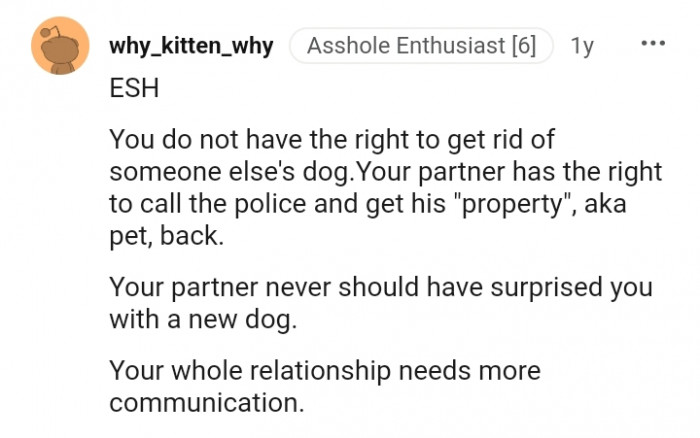
Encouraging partners to express their feelings about each other's pets can foster a sense of understanding and empathy. Utilizing 'I' statements can help articulate feelings without placing blame, allowing for more constructive discussions about shared responsibilities and emotional investments.
Creating a shared plan for managing pet-related issues can also strengthen the bond between partners.
To address conflicts regarding pet ownership, couples can benefit from setting aside time to discuss their feelings and boundaries.
Establishing clear expectations about pet care and household belongings can reduce misunderstandings.
This proactive approach allows couples to address potential conflicts before they escalate.
No one here is a true pet parent
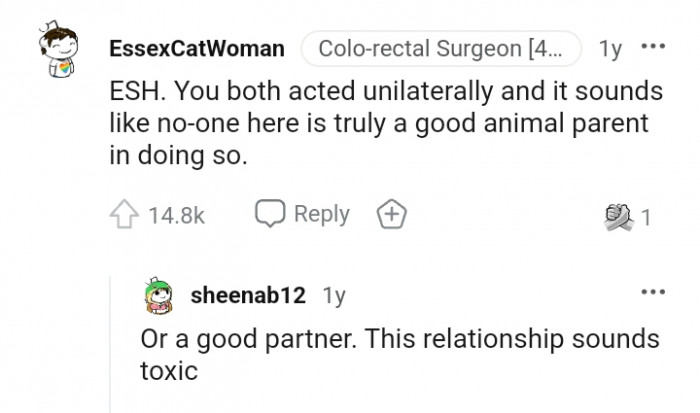
You suck for just shipping off a dog

You are both terrible at conflict resolution

Navigating Conflict and Emotional Responses
It's clear that emotional responses can drive decision-making in relationships. Dr. John Adams, a relationship psychologist, emphasizes that heightened emotional states often lead to irrational decisions that can damage relationships.
Research has shown that individuals in conflict tend to revert to fight-or-flight responses, which can cloud judgment and escalate tensions, especially when pets are involved.
Exploring Emotional Attachments to Pets
The emotional bond between humans and pets is significant and often overlooked in relationship conflicts.
Research shows that pets can serve as sources of comfort and emotional support, making it challenging to navigate disagreements about them.
Understanding this attachment can provide valuable context for each partner's feelings.
You don't get rid of other people's pets
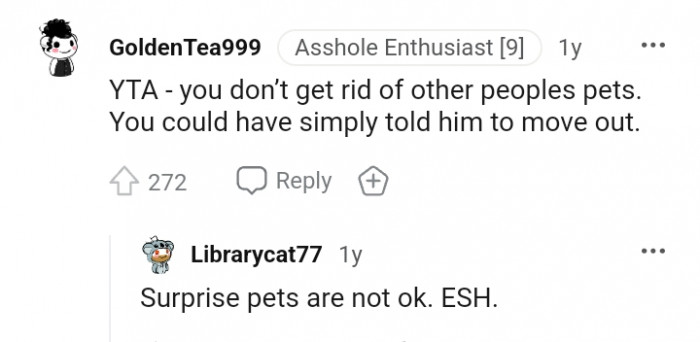
A breakup is the solution, according to this Redditor
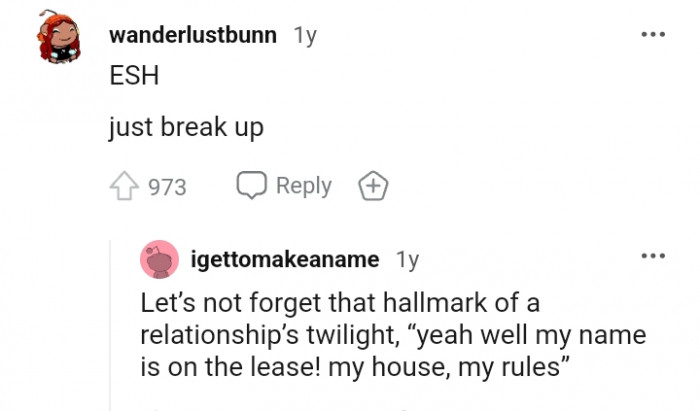
It takes months, if not years, to train a dog
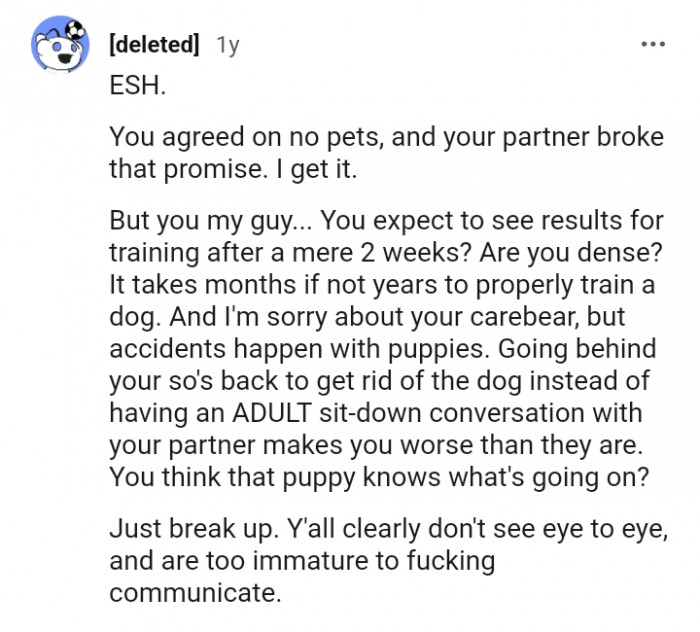
To navigate conflicts more effectively, couples can benefit from practicing mindfulness and emotional regulation techniques. Mindfulness has been shown to help individuals become more aware of their emotional triggers, leading to more thoughtful responses rather than reactive ones.
Engaging in couples therapy may also provide a space for partners to explore these dynamics and develop healthier communication strategies.
Encouraging partners to acknowledge their emotional investments in their pets can foster deeper understanding.
Recognizing that both partners may have a strong attachment to the pet can help bridge gaps in understanding and empathy.
This acknowledgment can lead to more productive conversations about pet-related conflicts.
They did something that affected you both
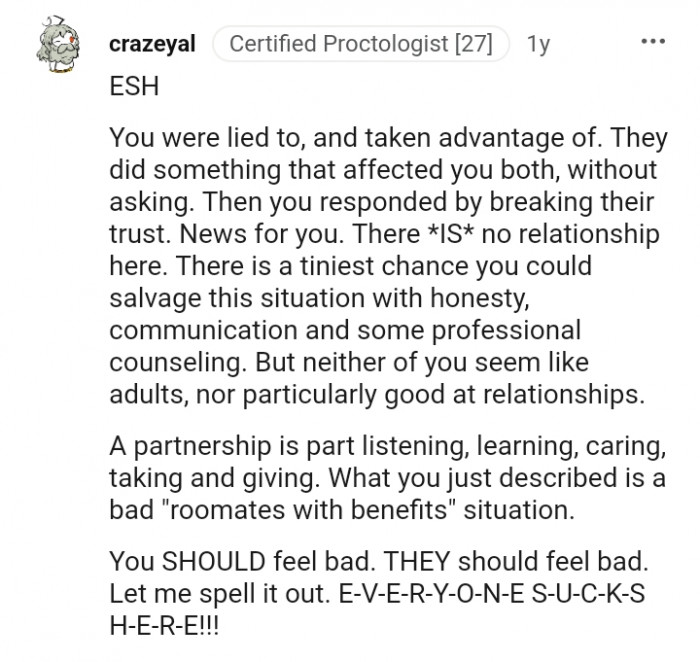
Your partner was wrong to get a pet...
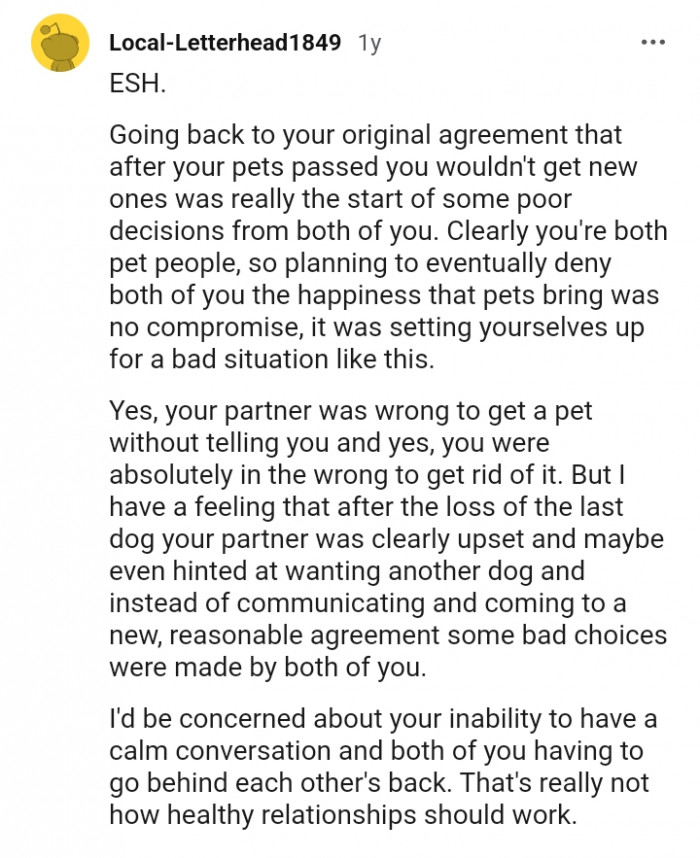
Don't give away someone else's dog

The Emotional Impact of Pets in Relationships
Pets often play significant roles in our emotional lives, serving as sources of comfort and companionship. Research from the Human-Animal Bond Research Institute indicates that pets can greatly enhance emotional well-being, making their presence in relationships vital.
When one partner feels that their attachment to a pet is being undermined, it can lead to feelings of betrayal and resentment, highlighting the importance of honoring these connections.
The Importance of Compromise
Compromise is essential in navigating conflicts related to pet ownership.
Research in conflict resolution emphasizes that finding common ground can strengthen relationships and build trust.
By working together to find solutions that satisfy both partners, couples can enhance their emotional connection.
It is an uncomfortable conversation
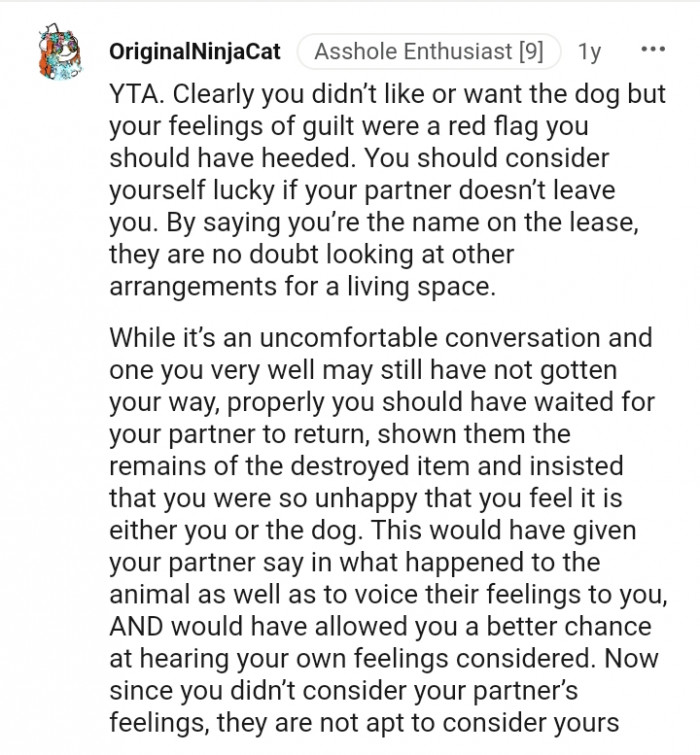
That is your ex-partner now

It sounds like you knew this was wrong
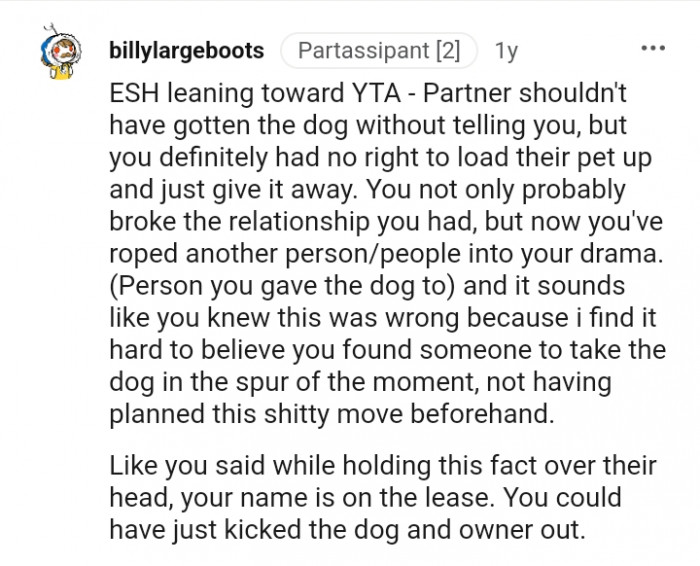
Creating a shared understanding of the emotional significance of pets can empower couples to navigate challenges together. Engaging in discussions about each partner's feelings towards pets and establishing boundaries around their care can promote a sense of unity.
Ultimately, fostering mutual respect and understanding around pet ownership can strengthen the relationship.
To promote compromise, couples can create a list of pet-related responsibilities and preferences.
This strategy allows both partners to express their needs while working toward mutually agreeable solutions.
By emphasizing collaboration, couples can foster a sense of teamwork in their relationship.
Dogs are compassionate, forgiving animals that never hold grudges. And no matter what they are doing, a dog is always nearby whenever you have a moment.
So you can imagine how the OP's partner felt coming home to find the dog was gone. In the end, the OP received the verdict of "Everyone Sucks."
You can share your thoughts about this story by leaving a comment below.
Psychological Analysis
This situation reflects common relationship dynamics where individual attachments and boundaries become points of contention.
It's crucial for partners to engage in open dialogues that respect each other's emotional investments while navigating their shared lives.
Analysis generated by AI
Analysis & Alternative Approaches
Understanding the underlying dynamics of relationship conflicts can provide insight into effective conflict resolution strategies.
According to Dr. Alexandra Solomon, a relationship therapist, "Effective communication is the cornerstone of any healthy relationship, allowing partners to express their needs and resolve conflicts." She emphasizes that "mutual respect and understanding are essential for navigating challenges together."
Analysis & Alternative Approaches
Clinical psychologists confirm that the emotional ties we have with pets can significantly impact our relationships. According to Dr. Michele Weiner-Davis, marriage therapist: "Pets can serve as a source of comfort and companionship, but conflicts over them can strain relationships." By prioritizing open communication and empathy, couples can navigate these challenges and strengthen their bonds.



